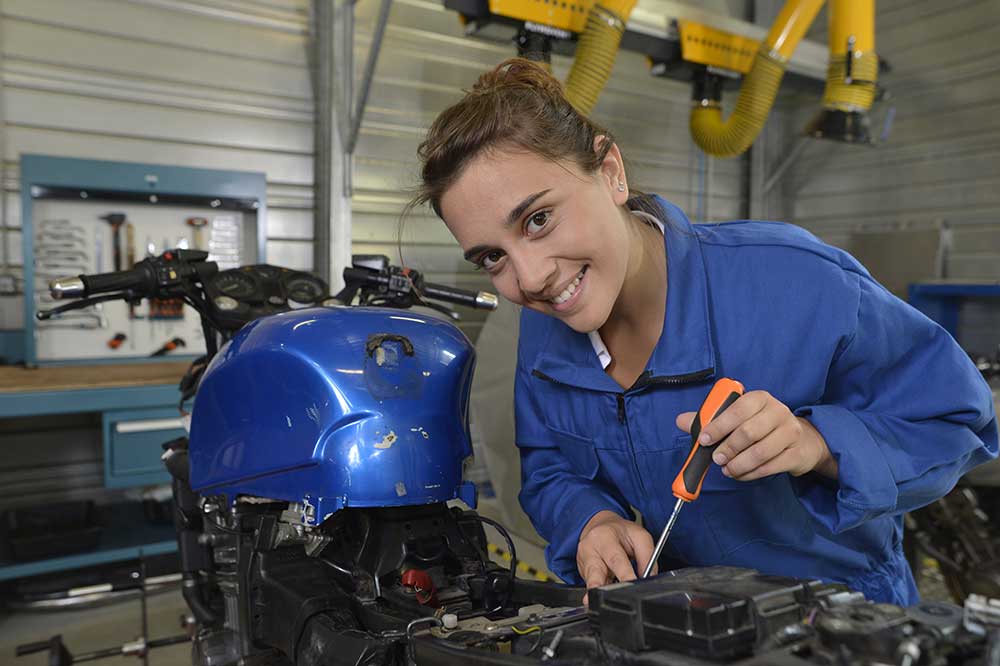Disclaimer: The information on our website is provided for general information purposes only. We make no representations or warranties of any kind, express or implied, about the completeness, accuracy, reliability, suitability or availability with respect to the website or the information contained on our website for any purpose. Any reliance on such information is therefore strictly at your own risk and we are not liable for any damages or losses arising out of or resulting from your reliance on any information contained on our website.
A motorcycle mechanic inspects these vehicles, diagnoses issues, and repairs the problem. In fact, these mechanics may even specialize in a particular motorcycle brand, fix dirt bikes, scooters, or even ATVs. Next, watch a video to learn what a motorcycle mechanic does:
How to Become a Motorcycle Mechanic

Though a motorcycle mechanic can learn the trade on-the-job, most employers look for candidates with experience. Because of this, if you do not have experience, you can gain the experience needed through a certification program.
Most earn a certification after high school according to O*NET OnLine. Additionally, programs cover everything from how engines work, transmissions, brakes, electrical systems, suspensions and chassis. They also show students how to troubleshoot what is wrong with a motorcycle.
However, if you want to get started without training, look for employers needing an automotive service attendant. These attendants perform minor repairs that you can learn quickly. This gives you entry-level experience as a mechanic. Watch a video showcasing what an automotive service attendant does.
Job Description of a Motorcycle Mechanic
The job description of a motorcycle mechanic can vary depending on where they work. Some motorcycle mechanics might work at a location specializing in crafting custom motorcycles for clients where other motorcycle mechanics focus on a particular brand of motorcycle and work at a dealership repair shop. Other mechanics work in general mechanic shops and fix a variety of small-engines ranging from motorcycles to scooters, ATVs to riding lawnmowers.
Mechanics must know how to maintain a motorcycle, inspect a motorcycle, perform diagnostic tests, and ultimately repair it. They must know every aspect from the engine to the brakes and electrical systems. They may also specialize in after-factory parts that can help a rider accessorize or customize their bike to meet their requirements.
Motorcycle Mechanic Career Video Transcript
Mechanical know-how, hand-eye coordination, and the ability to diagnose engine problems are some of the important qualities held by small engine mechanics. These workers inspect, service, and repair motorized power equipment— usually specializing in one type, such as motorcycles, motorboats, or outdoor power equipment. The repairs they work on can range greatly in complexity— from replacing a single part to rebuilding an engine. They work on all types of problems: fuel system, mechanical, and electrical.
Small engine mechanics use both computerized and pneumatic equipment, and also a variety of hand tools, which they usually own themselves. Small engine mechanics generally work in well-ventilated but noisy repair shops, from marina docks to the back of a hardware store. When breakdowns happen, they may make onsite repair calls in all kinds of weather. Although most work full-time, spring and summer are the busiest work seasons for these mechanics, and many work overtime to keep up with demand. Winter work hours may be shorter.
Employers include motorcycle, boat, and other motor vehicle dealers, lawn and garden equipment stores, and household goods repair and maintenance services. Small engine mechanics usually have a high school diploma or certificate and develop their skills through on-the-job training. It takes mechanics anywhere from several months to several years to become fully proficient. Employers increasingly prefer to hire mechanics with technical training.
Automotive Service Attendant Video Transcript
Automotive and watercraft service attendants perform maintenance and minor repairs on cars, trucks, buses, and boats. These workers may change the motor oil in a vehicle engine, fill gas tanks, replace lights or wiper blades, any of the many details that are essential to keeping vehicles operational. Attendants also order stock and receive deliveries, sell merchandise, clean vehicles, and keep their workspace and customer areas clean. Good customer service is important in this field, where developing long-term customer relationships is often a goal.
Attendants maintain records and may follow up with personal reminders about service due to a customer’s vehicle. Much of their time is spent outside, exposed to the elements and working with hazardous equipment or around contaminants. Attention to detail and dependability are crucial qualities, to avoid stranding a customer at sea with a malfunctioning engine. Automotive and watercraft service attendants typically have a high school diploma or equivalent. Related technical certificates may be helpful.
Article Citations
Bureau of Labor Statistics, U.S. Department of Labor, Occupational Outlook Handbook, Small Engine Mechanics.
National Center for O*NET Development. 49-3052.00. O*NET OnLine.
The career video is in the public domain from the U. S. Department of Labor, Employment and Training Administration.

